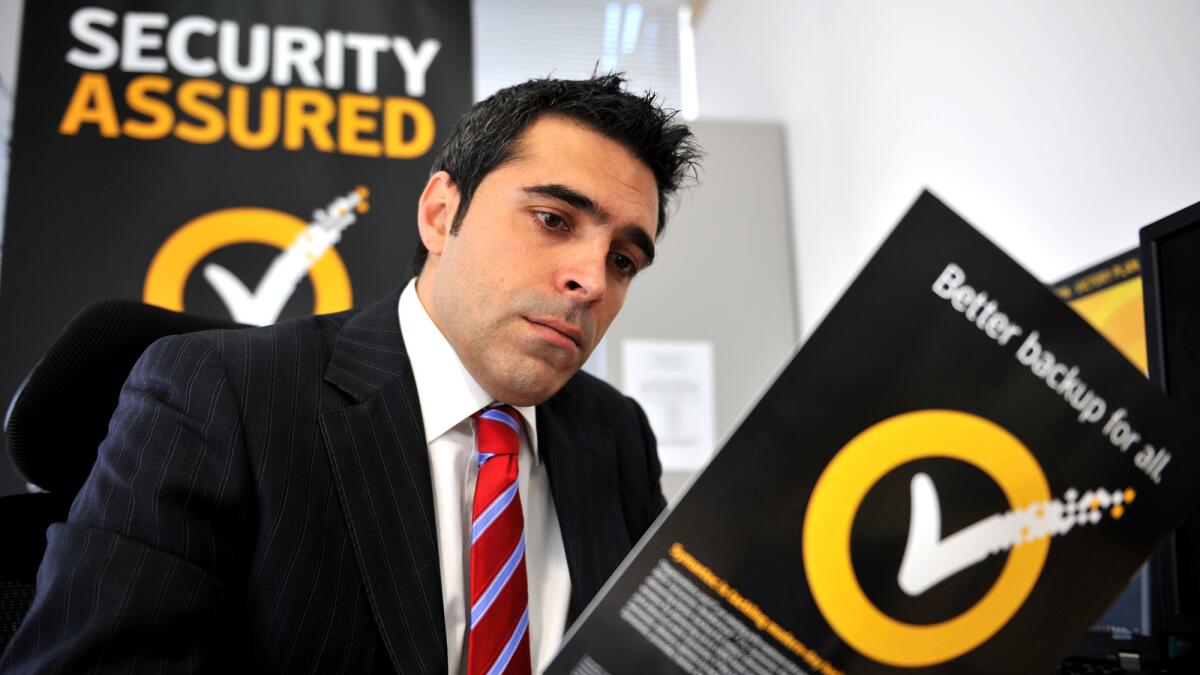Symantec stock dives 33% as mystery investigation has people imagining the worst

- Share via
For the last few years, Symantec Corp. seemed to have been doing everything right. The world’s top maker of cybersecurity software started selling more to corporations — chasing growth and balancing out its consumer-centric business. It made acquisitions and brought in a new chief executive. Its shares were rising.
So Wall Street was blindsided when the Mountain View, Calif., company disclosed that it is conducting an internal investigation that will delay the filing of its annual report and could potentially lead to a restatement of earnings. The news was tucked into the quarterly results late Thursday, and when analysts started asking questions, they were shut down. The company cut short the post-earnings conference call and canceled its scheduled callbacks later in the evening. That left analysts to fill in the blanks. And they imagined the worst.
“We believe this raises a red flag as it relates to the potential severity of this issue,” said Anne Meisner, an analyst at Susquehanna International Group, in a note to clients. She has a neutral rating on the stock and lowered its price target to $24.
The shares tanked 33.1% to $19.52 on Friday, taking about $6 billion in market value with them. At least 10 analysts lowered their price targets or ratings on the stock. The company’s bonds fell too.
Symantec said the board’s audit committee is looking into “concerns raised by a former employee.” The board has retained outside counsel to advise it and alerted the U.S. Securities and Exchange Commission.
The company beat analysts’ earnings estimates in its fiscal fourth quarter, though its outlook for the current period was disappointing. In any case, most analysts were far more concerned about the lack of information about the investigation.
“Despite the strong results, we believe this investigation creates too much uncertainty to have confidence in management’s fiscal 2019 guidance, as this could affect historical results and future demand trends,” said Andrew Nowinski, an analyst at Piper Jaffray. He downgraded the shares to neutral and lowered his price target to $24.
Symantec, which makes the Norton antivirus software, has struggled with a decreasing number of people buying the software for PCs, which historically has been a strong market. The company has sought to offset those declines with deals such as the $4.65-billion acquisition of Blue Coat Systems, which has lifted demand from corporations, and by targeting affluent consumers concerned about identity theft with the $2.3-billion acquisition of LifeLock in 2016.
Last year, Symantec looked into acquiring Splunk Inc., but decided against it after reviewing the analytics software company’s finances, people familiar with the matter said at the time.
Symantec has also shed businesses — such as its Veritas data storage division — thereby repositioning itself to focus on cybersecurity.
Greg Clark, who joined from Blue Coat and became chief executive of the combined company in 2016, brought experience in running a cybersecurity firm and provided what investors hoped at the time would be some much-needed stability after the company churned through multiple leaders in short order.
It wasn’t just Clark who joined Symantec after the Blue Coat acquisition. Almost the entire C-suite has changed since then. Former Blue Coat executives now occupy several key positions at Symantec, including CEO, chief operating officer, chief financial officer, chief strategy officer, chief technology officer and head of worldwide sales. Symantec has not identified the former employee who lodged the complaint that launched the internal probe, but the management turnover over the last two years suggests there are plenty of senior people with vast knowledge of the business who could have complained.
“While this may all amount to nothing, this is undoubtedly a serious matter and it could be a while before transparency and investor confidence improves,” said Gregg Moskowitz, an analyst at Cowen & Co.
Robertson writes for Bloomberg.






